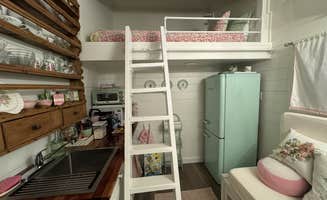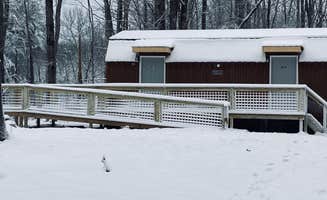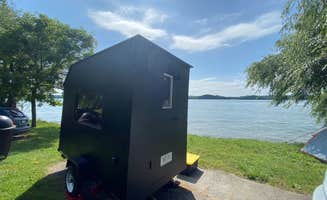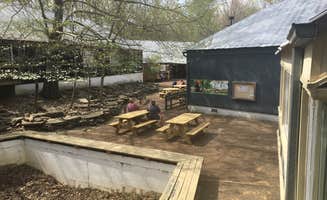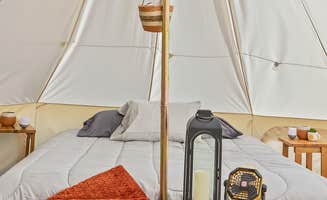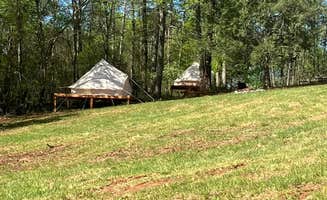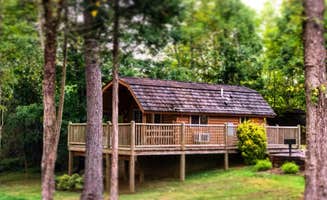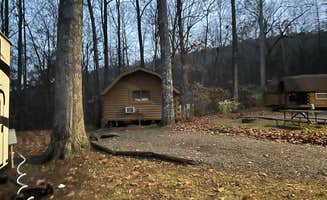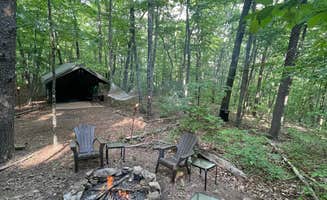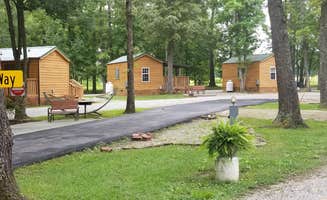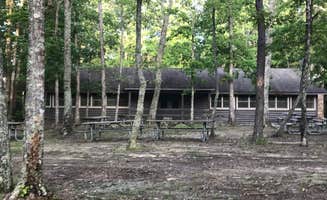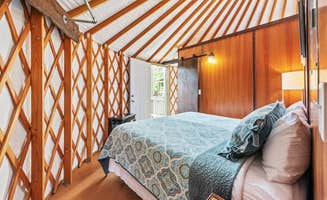Camping opportunities near Dunlap, Tennessee range from primitive backcountry sites to RV parks with full hookups. Located on the Cumberland Plateau at elevations between 1,400-1,800 feet, the area experiences milder summer temperatures than surrounding lowlands. Most campgrounds remain open year-round, though water systems at higher elevations may be winterized from November through March.
What to do
Waterfall hikes: 1-2 miles. The Savage Falls area offers multiple waterfall destinations within short hiking distances. "Perfect spot for a short hike-in backcountry camping experience. The hike in is less than two miles and the camp sites are secluded and spread apart," notes one Savage Falls Campground visitor. Another camper adds, "Great site right above the falls. A short walk down to a perfect little perch over the top of the falls and the stairs to the bottom."
Swimming holes: seasonal access. During summer months, natural pools form at the base of several waterfalls in the region. "I did really enjoy savage falls trail and the falls. There is a big parking area but it can fill up fast with those that are day hiking to see the falls," reports one camper about Savage Falls Campground. Water levels vary significantly by season and recent rainfall.
Rock climbing: multiple difficulty levels. The sandstone bluffs throughout the area provide climbing opportunities from beginner to advanced. Campers at Fall Creek Falls State Park mention diverse activities: "There's tons to do from hiking, to swimming, waterfall gazing, rock climbing, ziplining, and much more." The park features designated climbing areas with routes maintained by local climbing groups.
What campers like
Quiet wilderness settings: limited cell service. Many campers appreciate the secluded nature of sites along the plateau's edge. "Savage Gulf Natural Area is massive with several miles between entrance points that lead to stunning overlooks of the gorges and gulfs," writes one visitor to Alum Gap Campground. Another notes, "Perched on the rim and a nexus of trails that will take you to everything you want to see in this part of the park."
Dark night skies: star viewing. The relative distance from major cities creates opportunities for stargazing. "Very dark at night time, especially with little moon, the stars were jaw dropping," according to a Fall Creek Falls State Park camper.
Lakefront campsites: fishing access. Several campgrounds offer direct water access. "Beautiful views, waterfront sites, good fishing!" reports a visitor to Chester Frost Park. Another adds, "Love staying on the lake front and watching the sun set."
What you should know
Water supply limitations: filter needed. Most backcountry sites require campers to treat water. "Take your own water or filtration system," advises a camper at Alum Gap Campground. "Water a short walk from camp site if you are backpacking. My husband and I are very fond of this particular camp site."
Terrain challenges: significant elevation changes. The steep topography affects accessibility. "You gotta be super fit to get to this place but once you do, it's AMAZING. I did notice bear scat on my hike in and that was a bit of a concern," warns a backcountry camper. Trails often descend 400+ feet into gorges via metal stairs and rocky paths.
Weather considerations: rain impacts. The plateau receives higher rainfall than surrounding areas. "I visited in early October and plan on revisiting during more colorful time in the landscape and after a good rain to see what must be rapid waterfalls and streams," notes one camper. Flash flooding can occur in gorge areas during heavy rainfall.
Tips for camping with families
Beginner-friendly backcountry: short hikes. Several campgrounds offer backcountry experiences with minimal hiking. "The Alum Gap campground in Savage Gulf State Natural Area was a perfect destination for a first-time backpacker (like me!). The trail is easy-moderate, mostly flat with only a few inclines," shares a visitor to Savage Gulf State Park.
Glamping close to Dunlap, Tennessee: comfort options. Several sites offer prepared camping accommodations. "Our rv sites were gravel, required some leveling, had FHUs. 50/30/20 amp service, water and sewer of course. All worked great, no issues. Site included a trash can, fire pit with affixed grill and a picnic table," notes a visitor to Greeter Falls Campground.
Family activities: structured options. Established campgrounds offer additional recreation. "Many outdoor activities including tennis, basketball, volleyball, horseshoes, and a playground," reports a visitor to Rock Island State Park. Another adds, "The nearby swimming beach was great for the kids."
Tips from RVers
Access roads: navigable with caution. Most campgrounds can accommodate larger rigs despite mountain roads. "We visited this state park in our 40 foot motorhome. While there are only a few spots that will accommodate a rig this large, it's worth the time to haunt the reservation system and snag one," advises an RVer at Rock Island State Park.
Campsite specifics: length variations. RV sites vary significantly in size and levelness. "Camper pads are all paved but vary in length from 18 to 51 feet. The width of some can also accommodate two cars side by side. Not all are completely level," notes a camper at Rock Island State Park.
Local services: limited options. RVers should stock supplies before arrival. "Close to gas, food. I went to Coalmont. The Mexican food was authentic. Amazing," reports a Greeter Falls Campground visitor, noting the availability of basic services in nearby towns.


